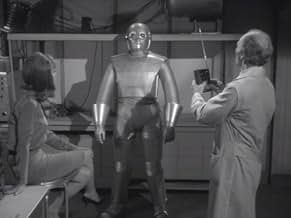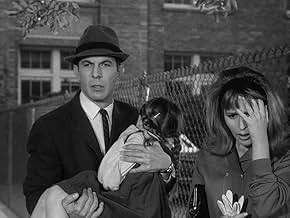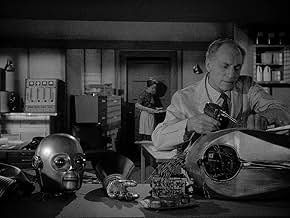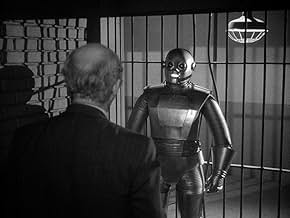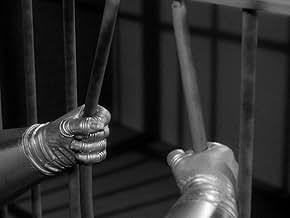A young woman hires a cynical lawyer to prove that her uncle was not killed by his invention - a sophisticated robot.A young woman hires a cynical lawyer to prove that her uncle was not killed by his invention - a sophisticated robot.A young woman hires a cynical lawyer to prove that her uncle was not killed by his invention - a sophisticated robot.
- Director
- Writers
- Stars
Howard Da Silva
- Thurman Cutler
- (as Howard da Silva)
John Caper Jr.
- Adam Link
- (voice)
- (uncredited)
Vic Perrin
- Control Voice
- (voice)
- (uncredited)
- Director
- Writers
- All cast & crew
- Production, box office & more at IMDbPro
Featured reviews
This episode is rather surprising because unlike a typical episode of "The Outer Limits", the special effects appear very good--as if the budget was rather large--which it was not. It's about a robot--and for a 1960s show, the robot is quite effective. Had the robot been cheesy looking, the episode would have been a lot less effective.
The show begins with the police chasing a robot across the countryside. Apparently 'Mr. Link' is assumed to have killed its creator. But the robot gives up without a fight and the Sheriff plans on having the mechanical man disassembled. An opportunistic newspaper reporter (Leonard Nimoy) wants to exploit this as a story and convinces the dead professor's niece to get the creation a lawyer (Howard De Silva). And much of the rest of the show consists of a court hearing to determine what to do next.
All in all, an effective and interesting show. It also helped having De Silva, as he was a gifted actor. It also helped that it was written well--with a real sense of heart. My only question is how did they do this show without driving Isaac Asimov crazy?! After all, he wrote the book "I, Robot" over a decade earlier and the show had an awful lot of similarities--yet Asimov isn't credited at all. Hmmmmm.
By the way, if you see the show don't you think that the character of the little girl was amazingly stupid?! One of the only weaknesses I saw in the story, actually.
The show begins with the police chasing a robot across the countryside. Apparently 'Mr. Link' is assumed to have killed its creator. But the robot gives up without a fight and the Sheriff plans on having the mechanical man disassembled. An opportunistic newspaper reporter (Leonard Nimoy) wants to exploit this as a story and convinces the dead professor's niece to get the creation a lawyer (Howard De Silva). And much of the rest of the show consists of a court hearing to determine what to do next.
All in all, an effective and interesting show. It also helped having De Silva, as he was a gifted actor. It also helped that it was written well--with a real sense of heart. My only question is how did they do this show without driving Isaac Asimov crazy?! After all, he wrote the book "I, Robot" over a decade earlier and the show had an awful lot of similarities--yet Asimov isn't credited at all. Hmmmmm.
By the way, if you see the show don't you think that the character of the little girl was amazingly stupid?! One of the only weaknesses I saw in the story, actually.
Howard Da Silva stars as a cynical lawyer named Thurman Cutler who is contacted by an equally cynical newspaperman named Judson Ellis(played by Leonard Nimoy) on behalf of a young woman(played by Mariana Hill) whose inventor uncle was killed in his laboratory, and the blame has fallen on a robot he created named Adam who has been captured, and is due for destruction. Cutler gets the robot a trial, but a guilty verdict seems like a foregone conclusion in the unscientific community it occurred in. Can Adam be saved, or at least redeemed? Interesting story about robotic rights vs. human fears works reasonably well, with a fittingly ironic end.
This is one of the best episodes I've seen of the original The Outer Limits, this time the only negatives being those derived from the culture and the time period. It is excessively human-centric, it oversimplifies, there are inconsistencies, it can get over-dramatic and it is *way* too obvious about the Frankenstein parallel(seriously; they literally say it several times), and that all hurts it. This is also essentially black and white, and winds up being preachy; however, after the hicks of the beginning, this does actually give arguments to both sides, and makes those that we are meant to disagree with be more than the standard one-note "evil" types. The writing isn't flawless, but it's pretty good, and manages to be clever(if not every attempt works, and some of it feels smarmy, because banter on the screen was "in" back then), and this does have points presented and lines of dialog that are memorable. Nimoy is cool as always, and the acting in general is fairly solid. While the humor varies a tad, there definitely is a laugh or two to be had in this. The effects are nice enough, and there are great details on the robot suit. I recommend this to any fan of science fiction as a forum in which to express thoughts that might seem controversial. 8/10
This is a nice episode. The problem is too much familiarity. The idea of proving an artificial intelligence is sentient is one of those staples of science fiction. Perhaps Asimov did it first, but the arguments are always the same. There is no question of the power of these things (in this case a really cheap looking robot) is at issue. It has to do with the protections we have from these man-made creatures. Could they have acted violently, given these safeguards? Everything is in how nuanced the trial works, how aggressive the negative forces are, and what the motivations of the bad guys are. Commander Data went through a couple of these on Next Generation an ultimately it seems to be an overzealous soldier type who sees an android or robot as one who does the wishes of others. I've always wondered if we would be so callous if such beings existed, at least in such an advanced state as this. Of course, emotions are frequently an issue to be debated as they seem to be at the separation point. Anyway, the trial is a lot of fun and the episode is quite satisfying.
PERHAPS WE ARE just a little overly enthusiastic about this episode. We come about this definitely slanted and decidedly prejudiced attitude honestly. Ours is a tradition of story reading and appreciation that has its roots in the genres of Science Fiction and the Super Hero; which were mainly featured in the pages of the Pulp Magazines and their visual counterpart, the Comic Book.
ANOTHER REASON WHY we have developed this devotion to the episode is that the author Eando Binder is a legendary writer in both the fields of the written narrative and the illustrated comics.
WHILE THIS IS just conjecture on our part, it would appear that this episode (as well as the I. ROBOT episode of the revival OUTER LIMITS Series of 19095-2002) was probably intended to be a pilot episode for a spin-off series of ADAM LINK.
WITHOUT THE AUTHOR'S being heavy handed, over dramatic or sanctimonious, the general tone of the stories are a sort of reminder to we of the Human Race to check our moral compass and never forget those basic foundational items such as the Golden Rule. In this Age of fanatical terrorism, questionable moral equivalences and total disrespect for Human Life, we need Adam Link more than ever.
INCIDENTALLY, THIS WRITER'S name of "Eando" was a nom-de-plume of two brothers. Earl and Otto Binder combined their first initials and thus E and O became "Eando."
WHEN WE TOLD Schultz about this his comment was: "Clever, these Americans!"
ANOTHER REASON WHY we have developed this devotion to the episode is that the author Eando Binder is a legendary writer in both the fields of the written narrative and the illustrated comics.
WHILE THIS IS just conjecture on our part, it would appear that this episode (as well as the I. ROBOT episode of the revival OUTER LIMITS Series of 19095-2002) was probably intended to be a pilot episode for a spin-off series of ADAM LINK.
WITHOUT THE AUTHOR'S being heavy handed, over dramatic or sanctimonious, the general tone of the stories are a sort of reminder to we of the Human Race to check our moral compass and never forget those basic foundational items such as the Golden Rule. In this Age of fanatical terrorism, questionable moral equivalences and total disrespect for Human Life, we need Adam Link more than ever.
INCIDENTALLY, THIS WRITER'S name of "Eando" was a nom-de-plume of two brothers. Earl and Otto Binder combined their first initials and thus E and O became "Eando."
WHEN WE TOLD Schultz about this his comment was: "Clever, these Americans!"
Did you know
- TriviaThis episode is based on a short story by Eando Binder, which both predated and influenced Isaac Asimov. The publisher of his collection of short stories used the same title, despite Asimov's wishes.
- GoofsWhen Adam is hit by the police wagon on the cross street, a white car in the background moves backwards, indicating that the scene was shot with Adam standing up in front of the car so that it looks like he is falling when played backwards.
- Quotes
[prologue]
Control Voice: God looked upon His world and called it good, but Man was not content. He looked for ways to make it better and built machines to do the work - but in vain we build the world unless the builder also grows.
- ConnectionsFeatured in For the Love of Spock (2016)
Details
- Runtime
- 51m
- Color
- Sound mix
- Aspect ratio
- 1.33 : 1
- 4:3
Contribute to this page
Suggest an edit or add missing content

